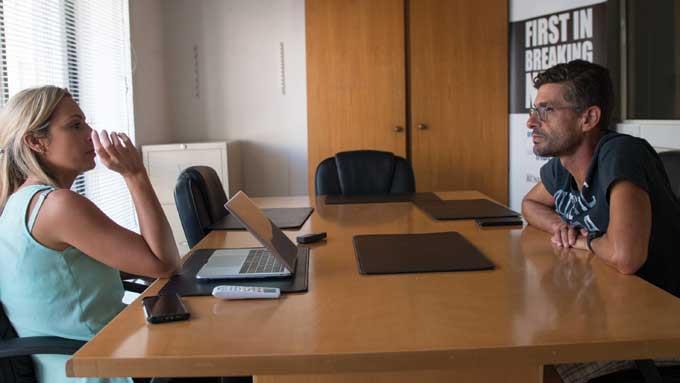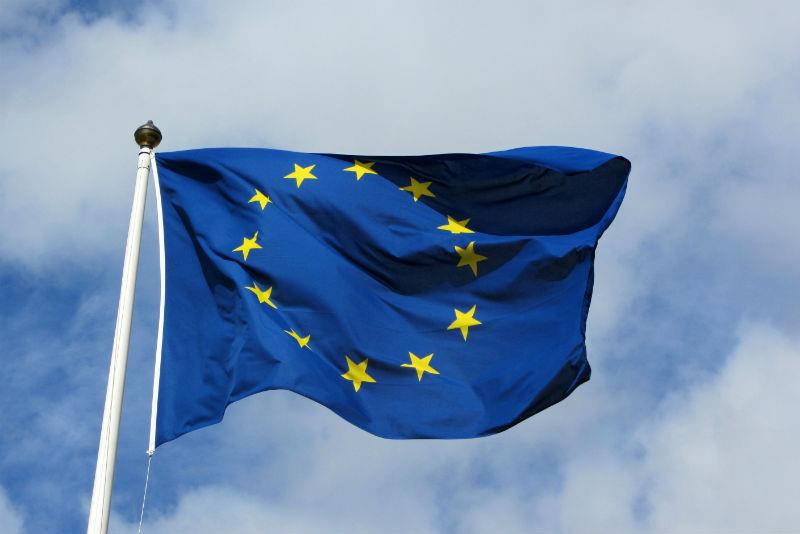Edward and his brother are both divers and over the last few years have noticed an alarming increase in plastic on Malta's seabeds.
The more one is aware of the problem the more noticeable it becomes and the more one realises how big the problem is, Edward explains.
Edward started looking into what actually happens to plastic if it is not recycled. This research led him into the field of microplastics - very small particles of plastic which end up in the food chain and in marine life. Another type of microplastic, called microbeads are are also added as exfoliants to health and beauty products, such as some cleansers and toothpastes.
Questions like where does this plastic come from, how does it effect us were all on Edward's mind when he first started noticing this problem. As a result he filmed a documentary called Oceans Malta to investigate the subject further.
During filming he noticed that most questions he was posing were the same that the general public had, so he created the group No to Plastic Malta to raise awareness on the subject.
One of the first things Edward points out however, is "you cannot abolish plastic, it is part of our daily life but there are ways and means in which this material can be used. If plastic can last for hundreds of years why do we have use it for five minutes and throw it away?"
Why should we say no to plastic?
Theoretically if plastic is used correctly and put for recycling it is ok to use. The problem is that plastic is not being recycled, with recent statistics showing that worldwide only 10% of plastic is recycled.
The remaining 90% is either ending up in landfills or is incinerated resulting in a waste of resources. In time, plastic starts to decompose forming smaller particles.

Recent studies show that these particles are ingested by plankton - the most basic element in the food chain. Once it is ingested by plankton, the plankton gets eaten by fish resulting in chemicals from the plastic being released in the fish.
Plastic can even be eaten by birds, even before it gets to the smaller organisms. This is especially true for birds that spend most of their time at sea looking for food. The bird then gives this plastic to its chicks. The chicks' stomach is filled with plastic so it thinks its stomach is full but it is not actually eating so it dies.
"The repercussions of plastic are not so simple as to say it only goes in one food chain. It spreads out all over."
How does plastic end up in the sea?
If plastic waste is placed in landfills there is nothing from stopping it from ending up in the sea. If it starts raining it will seep its way through the land ending up in the sea.
The same happens with plastic found in the street, after the first rainfall it will end up in the sea through drains. Furthermore wind also carries plastic waste into the sea.
About 80% to 90% of the plastic found in the sea originates from land.

How does plastic effect humans?
Since fish eat plastic and humans eat fish certain chemicals propagating from plastic do end up in humans. These chemicals have also been found in other large organisms such a turtles and dolphins.
A study is currently ongoing to see if the plastic that ends up in humans is of a high enough percentage to cause harm. No conclusive studies have been carried out, yet it is known that these chemicals are carcinogenic.
"So does that mean we should not alarm ourselves because at the moment there is no research?" Edward asks. "Should we wait for conclusive research before taking action or should we take action now?" He believes that of course we should take action now to avoid repercussions later on.
Is the problem getting worse?
"The problem of plastics is growing at a most alarming rate," Edward notes, due to the increased use of plastics.
Awareness about the use of plastics is only something very recent and a lot of research is currently ongoing. A lot is being discovered through this research for example the South Pacific garbage patch - an area of elevated of marine debris and plastic particle pollution. Plastic hidden under water is being found which was never discovered before.
Plastic is also a relatively new material so its implications are relatively unknown. "Plastic is a good material but we are taking it for granted and abusing of it. If certain parts of cars were not made of plastic for example we would have more carbon dioxide pollution."
Can we live without plastic?
"No, at this moment in time it would not make sense but we can live without single-use plastic."
Edward notes that it is very difficult to avoid plastic with everyday items as most items we buy are wrapped in plastic.

What is single-use plastics?
Single-use plastics, or disposable plastics, are used only once before they are thrown away or recycled. These items are things like plastic bags, straws, coffee stirrers, soda and water bottles and most food packaging.
Straws are one item which is used in abundance with America consuming about 50 to 100 million straws per day.
With other items made of plastic which are not single use Edward says "at least there is a life span and it will be reused. We are generating a lot of waste which we can do without."
Is recycling the solution?
Whilst recycling is commended, the rates are so low that the initial solution should be to reduce consumption of plastic. In Malta the rates of recycling are only at about 30%.
"Recycling is trying to cover up the problem... Any strategy towards waste lists reduction first then reuse as much as possible and then recycle."
Also items like plastic bags because they are so thin are difficult to recycle.
Using something that is not really needed, even though maybe it does not harm the environment, still uses resources for its production.
In fact, recycling itself uses up resources which are bad for the environment. Furthermore only a small percentage of the plastic being recycled is being reused.
For example plastic contaminated with even a little bit of food will not be recycled. This means any items placed in the grey bag for recycling needs to be clean otherwise it will just go with the main waste.
For manufacturers it is also so much more convenient to use new material rather than going through the process of recycling and using recycled plastic. The amount of recycled plastic which is being used at the moment is very low.
If the recycled material is not made use of it is just either left lying around or dumped in landfills anyway. The concept of recycling is good however at the moment it is not being implemented as it should be.

How can single-use plastic be avoided?
Most of the time it is more convenient and cheaper to use plastic like plastic plates, cutlery and glasses at a BBQ. Edward refers to the days prior to plastic where people used to take their own plates, cutlery and glasses and take them back home to wash.
Plastic bags can easily be replaced by cloth bags and simply drinking from a glass without a straw is an easy way not to use single-use plastic.
There are certain supermarkets that are encouraging people to take their own bags to fill with fruit and vegetables, rather than using plastic packaging or small plastic bags.
Unfortunately with soft drinks there is no solution other than plastic bottles but with water a refillable bottle can used. At home a dispenser or filtered water can be used instead of many large plastic bottles.
There are also water refilling stations around Malta which encourage people to carry their own refillable bottles and fill them against a small payment. Edward believes that if these refilling stations are promoted more, especially near beaches, it would be a very good step forward.
Due to the large amount of straws used it is important that plastic ones are avoided. A variety of other materials are now available like paper, bamboo, PLA - a renewable plant based material.
The problem with alternative materials is that it costs more since plastic is very cheap to buy. However, Edward believes it should not be the customer to make the decision of having to buy the more expensive item but the Government should incentivise it making the decision easier.
Edward believes that single-use plastic should eventually be taxed to make it easier to choose alternative materials.

Why are plastic bags still being given out for free?
Edward explains that there is a tax on a certain size and type of plastic bag which implies that the plastic bag can only be given to the customer against payment. This was done as an incentive for people to bring their own reusable bags.
However, at most stores small plastic bags are being given out for free. Edward says that these types of bags are not covered by the law and the law is somehow being bypassed.
He comments that these small plastic bags are even worse for the environment - if one has a decent sized plastic bag it can be used for something else. These small plastic bags have no other use thus creating more of a problem.
The Malta Independent put questions regarding this issue to the Ministry for the Environment, Sustainable Development and Climate Change but no answer was forthcoming at the time of going to print.
What is the European Commission and the local government doing about plastics?
One of the initiatives proposed by the government was the cash for bottles scheme which is similar to the system used in the past for returnable glass bottles. Edward believes that this will be a good step in the right direction when it comes into force.
This scheme was introduced in several other countries in Europe with great success with return rates up from around 20% to 90% in certain countries.
The ministry was also questioned by this newspaper about what is being done by the government to reduce single-use plastic but no reply was forthcoming at the time of going to print.
On the other hand, the EC is prompting a circular economy which is the alternative to a linear economy - make, use, dispose. It is trying to give more incentives to the industry to make use of recycled plastics.
It is also proposing a ban on single-use plastic products such as cotton buds and plastic straws and putting the burden of cleaning up waste on manufacturers in an effort to reduce marine litter.
More incentives are being put forward for researchers to study biologically based materials - to diversify the material and find something that is as flexible as plastic which is made from renewable, natural sources.
During a conference titled Our Ocean held in Malta last year several local politicians noted the harm caused by plastic. "They are realising that it is serious. It is being considered, after global warming, the second major environmental catastrophe which the world is facing at the moment."

Is there awareness about plastic in Malta?
Schools are doing a lot, with one particular school even introducing their own plastic bottle return scheme. At their tuck shop when the students purchased a plastic bottle they were charged an extra 5c. When they returned the bottle the 5c was given back. The rates of return of plastic bottles were much higher.
"Kids are the future but we also need to look at the present. People need to educate themselves more."
Edward believes that if people start understanding why we should use other alternatives to plastic their actions will change. This what he is trying to be achieve through the Facebook group No to Plastic Malta.